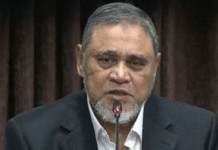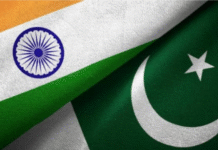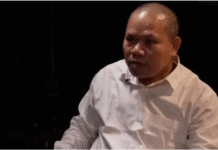
The new democratic government of Myanmar has signalled a paradigm shift in its relations with Bangladesh, ending decades of mistrust between the next-door neighbours.
Talking to a number of leaders of National League for Democracy (NLD) that won general elections and assumed power, Prothom Alo understands that Myanmar, a pariah state for almost five decades, which is located as the gateway between South and Southeast Asia, is now going to reach the closest neighburs like Bangladesh, as part of its policy of opening up to the world today.
“I’m quite sure the new government wants to maintain good relations with Bangladesh,” said secretary of Foreign Relations Committee of Myanmar parliament Bo Bo Oo.
He acknowledged the relations between previous Myanmar governments and the Bangladesh government were ‘quite chilled’.
A government in which NLD leader Aung San Suu Kyi is acting as foreign minister, is all but set to redefine Myanmar’s external orientation.
“I hope that the new government will change the course and also the Bangladesh government will take step to remove all barriers,” said Bo Oo.
NLD spokesperson Nyan Win said they have to deal with all the bordering countries including Bangladesh, India, China, Thailand and Laos.
Blaming border dispute and military exercise for the cold relations between the two neighbours, Bo Oo expressed high hopes of change in relations during the democratic era. “I have my own optimistic thinking and I believe that it will be fine, it will be okay.”
In this context, he referred to the lower volume of bilateral trade — below US$100 million annually – and said the two countries need to improve relations and undertake efforts to enhance trade.
Connectivity can offer opportunity for both the countries as Myanmar, he believes, can use itself as a strategic corridor between Bangladesh and South East Asia.
Currently, Bangladesh, China, India and Myanmar are trying to establish an economic corridor from Kolkata to Kunming to improve the socio-economic conditions of the sub-region where 400 million people live.
Tin Oo, former president and present chief patron of ruling NLD, insists that every problem must be settled through peaceful and harmonious ways.
“We have a common border. We are going to observe on the principle of the Panchshila for the peaceful coexistence of both sides,” he said.
Panchshila or Panchshila Treaty is the five principles of peaceful coexistence of nations. “We have a good border. We are trying our best to stay peacefully as far as we can,” he said.
The 90-year-old army-man-turned-politician recalled that he was the commander of Bangladesh-Myanmar border during Bangladesh’s independence war.
NLD spokesperson Nyan Win expressed his views that there is a big difference between the democratic government and the previous military government.
“They were thinking of all the matters through military minds. We think issues using political means. It is a big difference,” he pointed out.
About Bangladesh-Myanmar relations, he, however, maintained that if there are too many arguments, it would not be beneficial for both the sides and things would not proceed.
“We have to remain friends. We are friends,” he said.
About resolving disputes through talks, he said both Bangladesh and Myanmar did it in the past.
“I think three years ago there was a problem in Naf River. We solved that problem through discussion in Bangladesh and solve it peacefully,” he said.
Source: Prothom Alo









